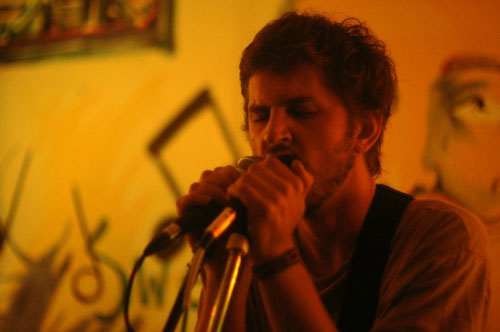Interview With Pat Jordache
Ahead of playing Maisonneuve's "Music We Hate" launch party on July 8, Pat Jordache discusses friendship, Frank Sinatra and why contemporary music kind of blows.
Patrick Gregoire is a man about Montreal, having played in bands like Islands and Sister Suvi before creating stylized soul-rock under the stage name Pat Jordache. He’s also got a gift for the ear-grabbing gimmick: his new self-recorded album, Future Songs, is available only on cassette or as a pay-what-you-can digital download. Pat Jordache sat down with Maisonneuve at Montreal’s le Cagibi café to talk about his influences, recording process and our “Music We Hate” issue launch party—which would take place in the very room we were sitting.

Aaron Vansintjan: Are you going to play with a band at the launch party?
Pat Jordache: For this show, yeah. I have a band that’s a bit of a rotating cast, but these days has been myself playing bass and singing and using a short loop pedal, then two drummers. It’s a weird line-up, because there’s no guitars or anything. It’s really sparse.
AV: Have you played any other shows with this band?
PJ: Yeah, we just came back from a two-week tour doing houses and DIY spots in the States. We did a show in this room as well—the release show for the tape. There might be another Cagibi show at some point in July. I also work here, so I just can’t seem to get enough.
AV: You just came out with this album. How did you do the recording?
PJ: Audacity was the first thing I used, and then I used a shitty old Toshiba that I inherited from my uncle, using a four-track for the pre-amps. I would record until Audacity would max out and panic and basically could accept no more. And then that computer died and I got another one that I used for a while. I used a whole bunch of different computers and different free software. Always just really fucking ramshackle.
AV: How did you keep that all together?
PJ: I mean, I don’t know—arguably it doesn’t stay together. You can get away with a lot of stuff as long as you have the same voice or the same songwriting style holding it together.
AV: How much do your instruments and equipment limit or define your sound?
PJ: I think limitations are everything. I didn’t have money so I didn’t go to a studio; I didn’t have a proper computer so I used free software; I couldn’t play the drums so I’d use a sequencer; I’m no Frank Sinatra so I’d do weird things with my voice. I feel like without limitations you have nothing but this terrifying wide-open realm of possibilities. There’s a sound to people striving, and trying really hard, that’s just irreplaceable.
AV: It’s weird because you can have super-groups and they can have so much money, but it’s not just because they’re all good musicians that they’ll make a good album.
PJ: Often not the case. So many of those dream-team records are so boring because they’re so uninspired. It’s just people waltzing in and nobody likes that kind of swagger in rock ‘n’ roll.
AV: Are there any contemporary bands that you like these days?
PJ: I really like Ariel Pink. He’s pretty impressive to me. Who else? I was really into the Dirty Projectors for a long time. I was less on board with that last record, Bitte Orca, but everything up until then I thought was pretty inspiring. I don’t know. I don’t listen to a lot of contemporary bands. I almost deliberately try to keep my ears pure.
AV: A lot of music that people like these days follows these trends. It’s as if you can just blend these trends and have a band that’s really popular immediately.
PJ: I met some kids on tour in Atlanta that were just so aware of what the new thing was. It was cool, but it’s so exhausting to try and stay ahead of that. You’re just selling yourself short. They were in Atlanta and they were copying bands from Brooklyn and New Jersey.
AV: What is your music inspired by?
PJ: I get really inspired by friends. Making this record, I was really inspired by my friend Merrill Garbus, who’s got a project called Tune-Yards, and she made this really sweet DIY home-recorded record a year ago. That was just a really inspiring thing to me—to realize that you didn’t need anything except for your own willpower and time to realize your music and the results were a lot more interesting. It sounds like what you want to sound like. You’re not watching a clock tick away in some expensive studio or anything. That’s probably the number one influence on this record; she kinda wrote the blueprint and I feel like I’m just following in her footsteps.
AV: How much is your community a part of your work?
PJ: A huge influence. I don’t think you can relate too much without a community, and I think that Montreal has been a really good one.
Pat Jordache plays Maisonneuve's "The Music We Hate" issue launch party on July 8 at le Cagibi (5490 St. Laurent) in Montreal, along with Charlotte Cornfield and Carl Spidla. $5 cover includes a copy of Maisonneuve Issue 36 (Summer 2010). Check out the launch party on Facebook.
Related on maisonneuve.org:
—Interview With Carl Spidla
—Interview With Charlotte Cornfield
—Edge of the Island
Subscribe to Maisonneuve — Follow Maisy on Twitter — Like Maisy on Facebook





